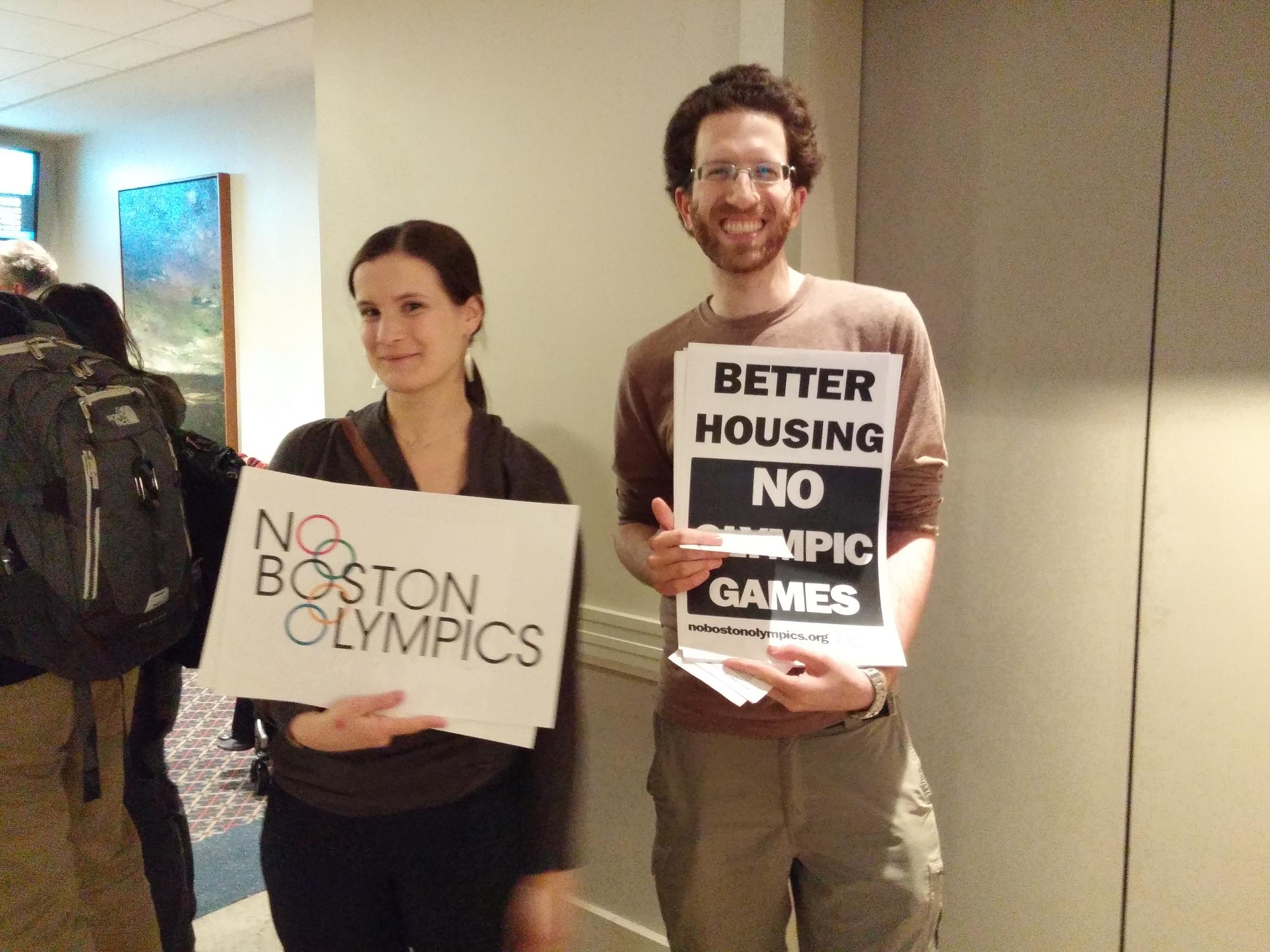If history does in fact repeat itself, Boston’s herculean efforts to host the Olympics in 2024 will result in pushing out the city’s “undesirables,” including a “not in our backyard” attitude toward the growing homeless population.
Opponents of Boston’s Olympics bid hosted a panel to discuss the games’ history of displacement and whether Boston could face similar issues if it wins hosting rights. Panelists included Seneca Joyner of Black Lives Matter Boston, Cassie Hurd of the Boston Homeless Solidarity Committee and Rene Bernal with translation by María Christina Blanco of City Live/Vida Urbana. The panel was hosted by No Boston 2024 and moderated by Dig Boston columnist and Scout Somerville editor Emily Hopkins.
Panelists noted that people most vulnerable to displacement in host cities were those living in low-income neighborhoods, communities of color and the homeless.
The 1996 Atlanta games have a well-documented history of aggressive displacement policies, from police actions to private interests buying land. Joyner, who lived in Atlanta during the ‘90s, describes the buildup.
“There was still this heady optimism,” she says. “ACOG [Atlanta Committee for the Olympic Games] and the Atlanta Housing Authority were really trying to reconstruct the city’s image, trying to turn an international city into a world class city,” says Joyner. “I’m hearing the same rhetoric from Boston 2024.”
When Atlanta won the bid, private investors and developers began buying up land in the city, which increased rent in the whole metro area. “If you stood still long enough, someone would build a house on top of you,” she continues. Joyner’s family, like many others, was forced out of the Atlanta metro area by increased rents. “Imagine being forced out of Jamaica Plain and into Worcester,” says Joyner. “That’s the scale of displacement we’re talking about.”
Atlanta also dismantled most of its low-income housing, including Techwood, the oldest public housing project in the country at the time, in the years leading up to the Olympics. It has since replaced all low-income housing units with mixed-income housing and the privately-owned Centennial Olympic Stadium and Coca-Cola museum, which are located near the old Techwood neighborhood.
While Boston 2024 and the city have promised not to displaced residents, Hurd says there’s no solid plan in place. Boston 2024 and the city have promised that thousands of units of affordable housing will be built and are already planned as part of Walsh’s Housing 2030 initiative. However, Hurd notes that “’affordable’ doesn’t necessarily mean ‘low-income.’” Per the Housing 2030 plan, most of the new, non-elderly units will be slated for households in the $50,000–$125,000 income range.
Both Seneca and Hurd note that the homeless are just as susceptible to displacement. Atlanta police issued over 9,000 citations to the homeless, turned sprinklers on them in certain areas and even issued one-way bus tickets out of town to homeless people.
The homeless had it rough in other host cities. London would flood areas where the homeless were known to congregate, and Vancouver police scattered homeless youth away from tourist areas during the games.
Bernal, whose answers were often translated by Blanco, warns about the current dangers of displacement in Boston. Living near Franklin Park, he’s experiencing the effects of rising rents personally, with his landlord currently threatening to double his family’s rent.
Bernal says Boston 2024 is promising economic progress to gain support in struggling Boston communities and even in cities like Lawrence, but, like many opponents, he doubts such economic promises will pan out.
Blanco also points to private developments in East Boston raising rents and forcing tenants from their homes—in fact, City Life organized both a march and an eviction blockade in East Boston that same week. “Gentrification and displacement are happening with or without the Olympics,” she says. Indeed, Business Insider recently listed Boston as one of the 15 most expensive cities in the country to live in, showing that housing concerns won’t fade even if the bid fails.
Additionally, officials are voicing skepticism. Governor Charlie Baker is frustrated with Boston 2024 vagueness and is scheduled to meet bid opponents. Boston City Councilor Ayanna Pressley spoke at a public forum with opponents of the bid and was quoted in BostInno telling the crowd: “This has never been ‘can Boston host’ … The question continues to be ‘should we?’”
A poll from WBUR found 40 percent of Boston-area voters support hosting the Olympic games, while 50 percent are against it. This is a slight increase of support from a March poll in which 36 percent of voters were in favor.

Leave a Reply
You must be logged in to post a comment.